AWM41 1072 - [Official History, 1914-18 War: Records of Arthur G Butler:] Interviews containing accounts of Nursing experiences in the AANS [Australian Army Nursing Service]. These nurses were interviewed by Matron Kellett - Part 10
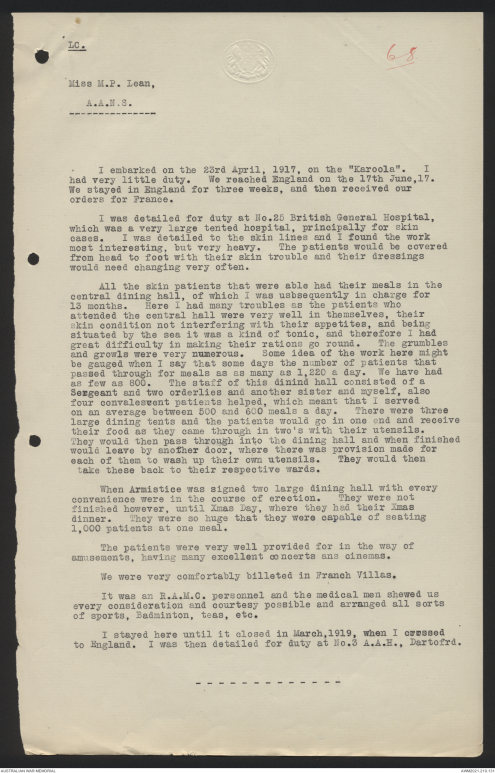
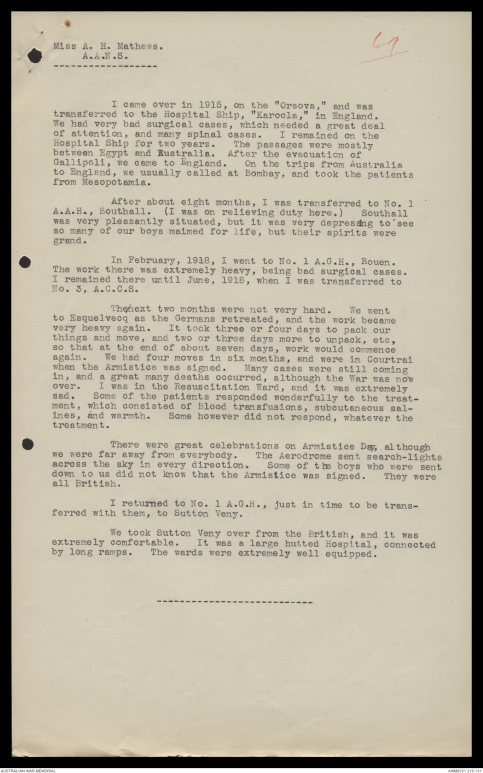
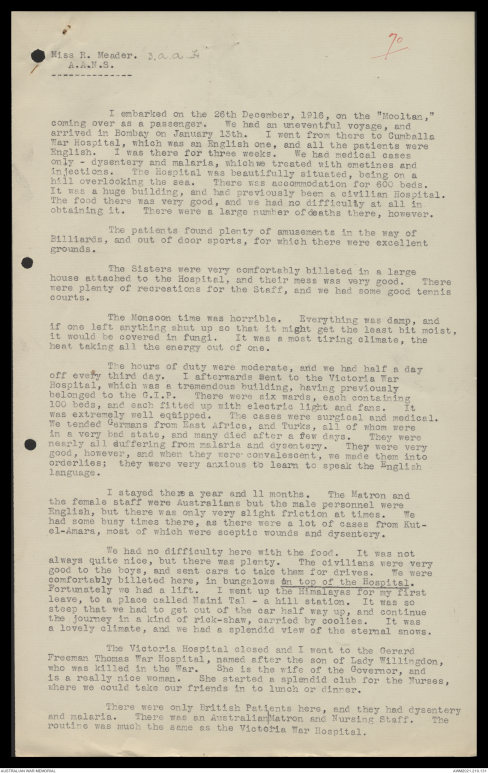
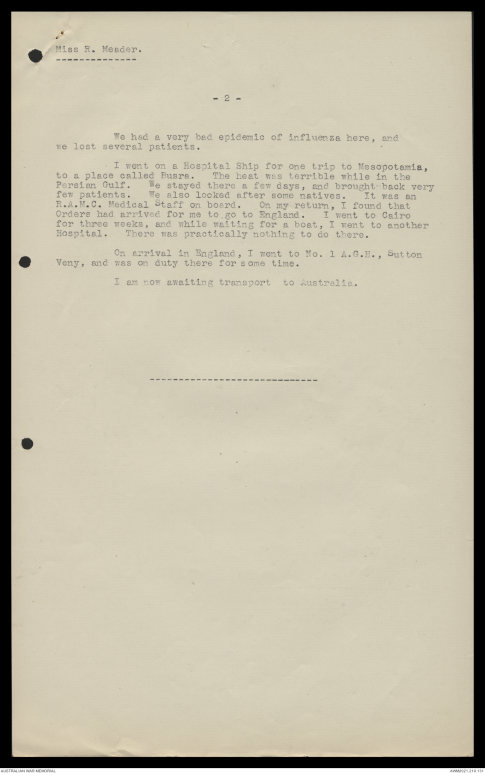
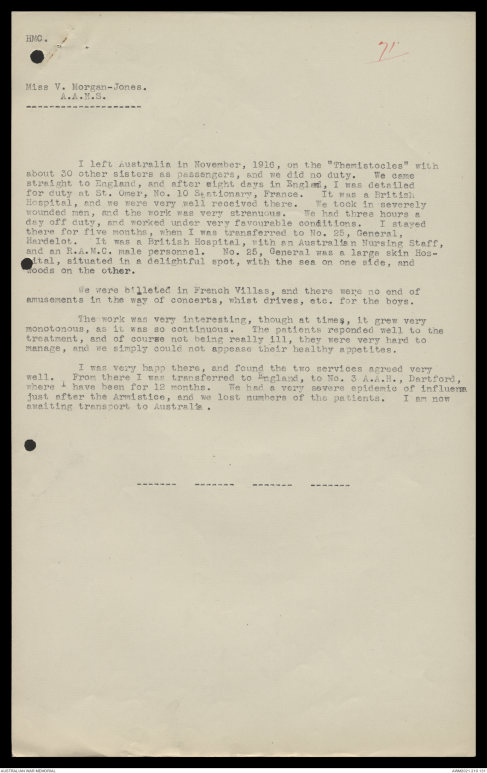
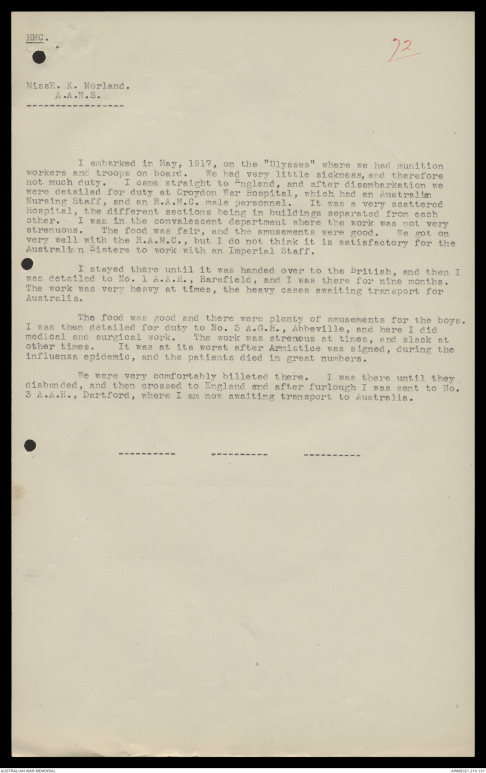
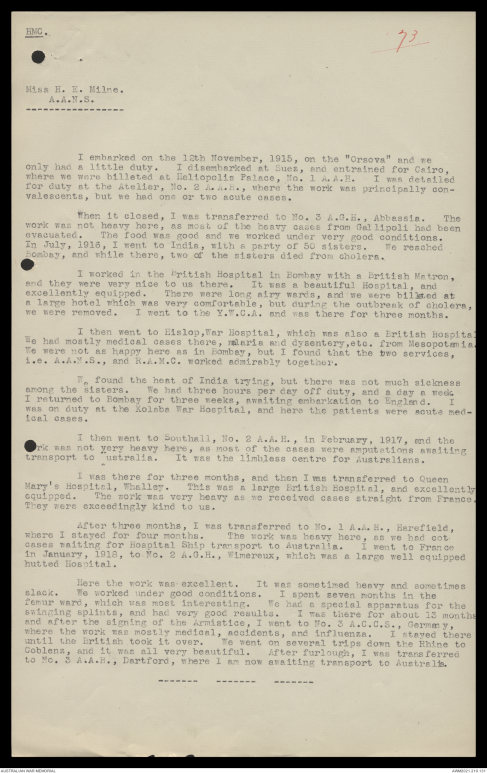
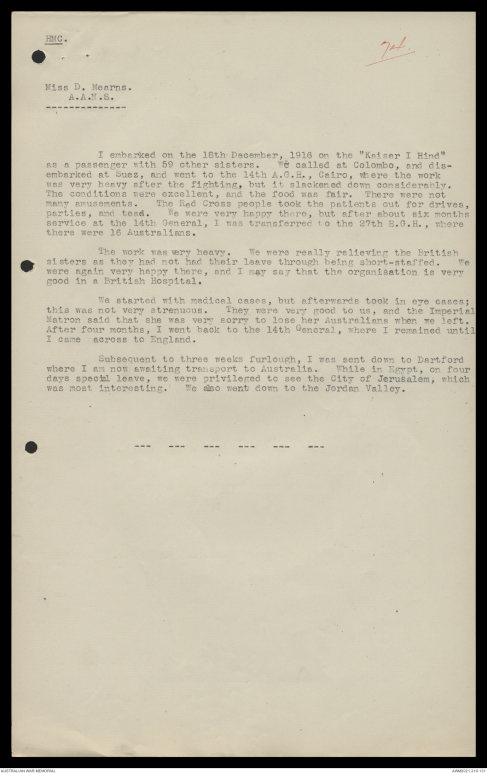
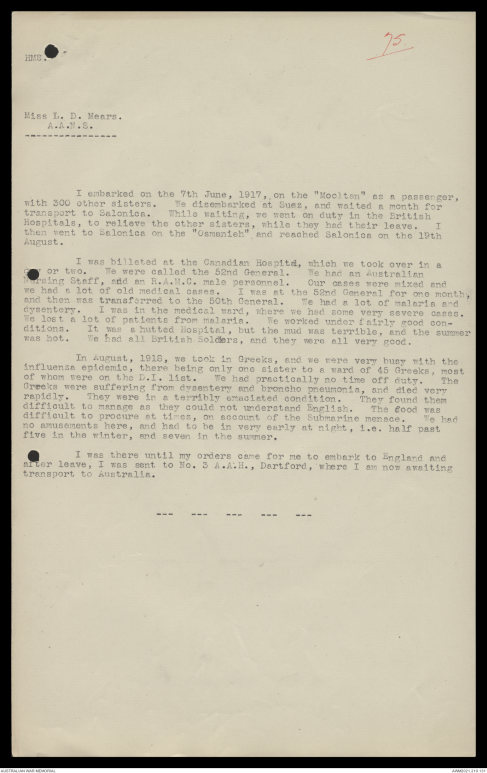
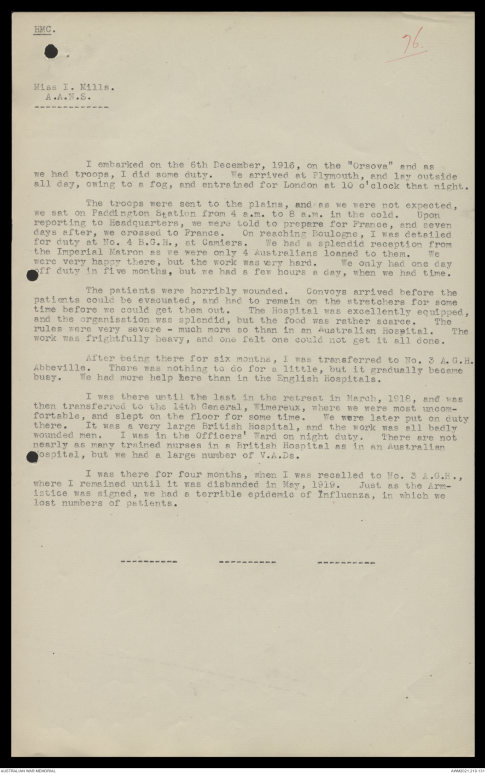
LC.
[*68*]
Miss M.P. Lean,
A.A.N.S.
I embarked on the 23rd April, 1917, on the "Karoola". I
had very little duty. We reached England on the 17th June, 17.
We stayed in England for three weeks, and then received our
orders for France.
I was detailed for duty at No.25 British General Hospital,
which was a very large tented hospital, principally for skin
cases. I was detailed to the skin lines and I found the work
most interesting, but very heavy. The patients would be covered
from head to foot with their skin trouble and their dressings
would need changing very often.
All the skin patients that were able had their meals in the
central dining hall, of which I was usbsequently in charge for
13 months. Here I had many troubles as the patients who
attended the central hall were very well in themselves, their
skin condition not interfering with their appetites, and being
situated by the sea it was a kind of tonic, and therefore I had
great difficulty in making their rations go round. The grumbles
and growls were very numerous. Some idea of the work here might
be gauged when I say that some days the number of patients that
passed through for meals as as many as 1,220 a day. We have had
as few as 800. The staff of this dinind hall consisted of a
Sergeant and two orderlies and another sister and myself, also
four convalescent patients helped, which meant that I served
on an average between 500 and 600 meals a day. There were three
large dining tents and the patients would go in one end and receive
their food as they came through in two's with their utensils.
They would then pass through into the dining hall and when finished
would leave by another door, where there was provision made for
each of them to wash up their own utensils. They would then
take these back to their respective wards.
When Armistice was signed two large dining hall with every
convenience were in the course of erection. They were not
finished however, until Xmas Day, where they had their Xmas
dinner. There were so huge that they were capable of seating
1,000 patients at one meal.
The patients were very well provided for in the way of
amusements, having many excellent concerts ans cinemas.
We were very comfortably billeted in Franch Villas.
It was an R.A.M.C. personnel and the medical men shewed us
every consideration and courtesy possible and arranged all sorts
of sports, Badminton, teas, etc.
I stayed here until it closed in March, 1919, when I crossed
to England. I was then detailed for duty at NO.3 A.A.H., Dartofrd.
[*69*]
Miss A.H. Mathews.
A.A.N.S.
I came over in 1915, on the "Orsova," and was
transferred to the Hospital ship, "Karoola," in England.
We had very bad surgical cases, which needed a great deal
of attention, and many spinal cases. I remained on the
Hospital Ship for two years. The passages were mostly
between Egypt and Australia. after the evacuation of
Gallipoli, we came to England. On the trips from Australia
to England, we usually called at Bombay, and took the patients
from Mesopotamia.
After about eight months, I was transferred to No. 1
A.A.H., Southall. (I was on relieving duty here.) Southall
was very pleasantly situated, but it was very depressing to see
so many of our boys maimed for life, but their spirits were
grand.
In February, 1918, I went to No. 1 A.G.H., Rouen.
The work there was extremely heavy, being bad surgical cases.
I remained there until June, 1918, when I was transferred to
No. 3, A.C.C.S.
The next two months were not very hard. We went
to Esquelvecq as the Germans retreated, and the work became
very heavy again. It took three or four days to pack our
things and move, and two or three days more to unpack, etc,
so that at the end of about seven days, work would commence
again. We had four moves in six months, and were in Courtrai
when the Armistice was signed. Many cases were still coming
in, and a great many deaths occurred, although the War was now
over. I was in the Resuscitation Ward, and it was extremely
sad. Some of the patients responded wonderfully to the treatment,
which consisted of blood transfusions, subcutaneous salines,
and warmth. Some however did not respond, whatever the
treatment.
There were great celebrations on Armistice Day, although
we were far away from everybody. The Aerodrome sent search-lights
across the sky in every direction. Some of the boys who were sent
down to us did not know that the Armistice was signed. They were
all British.
I returned to No. 1 A.G.H., just in time to be transferred
with them, to Sutton Veny.
We took Sutton Veny over from the British, and it was
extremely comfortable. It was a large hutted Hospital, connected
by long ramps. The wards were extremely well equipped.
[*70*]
Miss R. Meader 3.A.A.H
A.A.N.S.
I embarked on the 26th December, 1916, on the "Mooltan,"
coming over as a passenger. We had an uneventful voyage, and
arrived in Bombay on January 13th. I went from there to Cumballa
War Hospital, which was an English one, and all the patients were
English. I was there for three weeks. We had medical cases
only - dysentery and malaria, which we treated with emetines and
injections. The Hospital was beautifully situated, being on a
hill overlooking the sea. There was accommodation for 600 beds.
It was a huge building, and had previously been a civilian Hospital.
The food there was very good, and we had no difficulty at all in
obtaining it. There were a large number of deaths there, however.
The patients found plenty of amusements in the way of
Billiards, and out of door sports, for which there were excellent
grounds.
The Sisters were very comfortably billeted in a large
house attached to the Hospital, and their mess was very good. There
were plenty of recreations for the Staff, and we had some good tennis
courts.
The Monsoon time was horrible. Everything was damp, and
if one left anything shut up so that it might get the least bit moist,
it would be covered in fungi. It was a most tiring climate, the
heat taking all the energy out of one.
The hours of duty were moderate, and we had half a day
off every third day. I afterwards sent to the Victoria War
Hospital, which was a tremendous building, having previously
belonged to the G.I.P. There were six wards, each containing
100 beds, and each fitted up with electric light and fans. it
was extremely well equipped. The cases were surgical and medical.
We tended Germans from East Africa, and Turks, all of whom were
in a very bad state, and many died after a few days. They were
nearly all suffering from malaria and dysentery. They were very
good, however, and when they were convalescent, we made them into
orderlies; they were very anxious to learn to speak the English
language.
I stayed there a year and 11 months. The Matron and
the female staff were Australians but the male personnel were
English, but there was only very slight friction at times. We
had some very busy times there, as there were a lot of cases from
Kut-el-Amara, most of which were sceptic wounds and dysentery.
We had no difficulty here with the food. It was not
always quite nice, but there was plenty. The civilians were very
good to the boys, and sent cars to take them for drives. We were
comfortably billeted here, in bungalows on top of the Hospital.
Fortunately we had a lift. I went up the Himalayas for my first
leave, to a place called Naini Tal - a hill station. It was so
steep that we had to get out of the car half way up, and continue
the journey in a kind of rick-shaw, carried by coolies. It was
a lovely climate, and we had a splendid view of the eternal snows.
The Victoria Hospital closed and I went to the Gerard
Freeman Thomas War Hospital, named after the son of Lady Willingdon,
who was killed in the War. She is the wife of the Governor, and
is a really nice woman. She started a splendid club for the Nurses,
where we could take our friends in to lunch or dinner.
There were only British Patients here, and they had dysentery
and malaria. There was an Australian/Matron and Nursing Staff. The
routine was much the same as the Victoria War Hospital.
Miss R. Meader.
- 2 -
We had a very bad epidemic of influenza here, and
we lost several patients.
I went on a Hospital Ship for one trip to Mesopotamia,
to a place called Busra. The heat was terrible while in the
Persian Gulf. We stayed there a few days, and brought back very
few patients. We also looked after some natives. It was an
R.A.M.C. Medical Staff on board. On my return, I found that
Orders had arrived for me to go to England. I went to Cairo
for three weeks, and while waiting for a boat,, I went to another
Hospital. There was practically nothing to do there.
On arrival in England, I went to No. 1 A.G.H., Sutton
Veny, and was on duty there for some time.
I am now awaiting transport to Australia.
HMC.
[*71*]
Miss V. Morgan-Jones.
A.A.N.S.
I left Australia in November 1916, on the "Themistocles" with
about 30 other sisters as passengers, and we did no duty. We came
straight to England, and after eight days in England, I was detailed
for duty at St. Omer, No. 10 Stationary, France. It was a British
Hospital, and we were very well received there. We took in severely
wounded men, and the work was very strenuous. We had three hours a
day off duty, and worked under very favourable conditions. I stayed
there for five months, when I was transferred to No. 25 General,
Hardelot. It was a British Hospital, with an Australian Nursing Staff,
and an R.A.M.C. male personnel. No. 25, General was a large skin
Hospital, situated in a delightful spot, with the sea on one side, and
woods on the other.
We were billeted in French Villas, and there were no end of
amusements in the way of concerts, whist drives, etc. for the boys.
The work was very interesting, though at times, it grew very
monotonous, as it was so continuous. The patients responded well to the
treatment, and of course not being really ill, they were very hard to
manage, and we simply could not appease their healthy appetites.
I was very happ there, and found the two services agreed very
well. From there I was transferred to England, to No. 3 A.A.H., Dartford,
where I have been for 12 months. We had a very severe epidemic of influenza
just after the Armistice, and we lost numbers of the patients. I am now
awaiting transport to Australia.
HMC.
[*72*]
MissE.K. Morland.
A.A.N.S.
I embarked in May, 1917, on the "Ulysses" where we had munition
workers and troops on board. We had very little sickness, and therefore
not much duty. I came straight to England, and after disembarkation we
were detailed for duty at Croydon War Hospital, which had an Australian
Nursing Staff, and an R.A.M.C. male personnel. It was a very scattered
Hospital, the different sections being in buildings separated from each
other. I was in the convalescent department where the work was not very
strenuous. The food was fair, and the amusements were good. We got on
very well with the R.A.M.C., but I do not think it is satisfactory for the
Australian Sisters to work with an Imperial Staff.
I stayed there until it was handed over to the British and then I
was detailed to No. 1 A.A.H., Harefield, and I was there for nine months.
The work was very heavy at times, the heavy cases awaiting transport for
Australia.
The food was good and there were plenty of amusements for the boys.
I was then detailed for duty to No. 3 A.G.H., Abbeville, and here I did
medical and surgical work. The work was strenuous at times, and slack at
other times. It was at its worst after Armistice was signed, during the
influenza epidemic, and the patients died in great numbers.
We were very comfortably billeted there. I was there until they
disbanded, and then crossed to England and after furlough I was sent to No.
3 A.A.H., Dartford, where I am now awaiting transport to Australia.
HMC.
[*73*]
Miss H.E. Milne.
A.A.N.S.
I embarked on the 12th November, 1915, on the "Orsova" and we
only had a little duty. I disembarked at Suez, and entrained for Cairo,
where we were billeted at Heliopolis Palace, No. 1 A.A.H. I was detailed
for duty at the Atelier, No. 2 A.A.H., where the work was principally
convalescents, but we had one or two acute cases.
When it closed, I was transferred to No. 3 A.G.H. , Abbassia. The
work was not heavy here, as most of the heavy cases from Gallipoli had been
evacuated. The food was good and we worked under very good conditions.
In July, 1916, I went to India, with a party of 50 sisters. We reached
Bombay, and while there, two of the sisters died from cholera.
I worked in the British Hospital in Bombay with a British Matron,
and they were very nice to us there It was a beautiful Hospital, and
excellently equipped. There were long airy wards, and we were billeted at
a large hotel which was very comfortable, but during the outbreak of cholera,
we were removed. I went to the Y.W.C.A. and was there for three months.
I then went to Hislop, War Hospital, which was also a British Hospital.
We had mostly medical cases there, malaria and dysentery, etc. from Mesopotamia.
We were not as happy here as in Bombay, but I found that the two services,
i.e. A.A.M.S., and R.A.M.C. worked admirably together.
We found the heat of India trying, but there was not much sickness
among the sisters. We had three hours per day off duty, and a day a week.
I returned to Bombay for three weeks, awaitiing embarkation to England. I
was on duty at the Xolaba War Hospital, and here the patients were acute
medical cases.
I then went to Southall, No. 2 A.A.H., in February, 1917, and the
work was not very heavy here, as most of the cases were amputations awaiting
transport to Australia. It was the limbless centre for Australians.
I was there for three months, and then I was transferred to Queen
Mary's Hospital, Whalley. This was a large British Hospital, and excellently
equipped. The work was very heavy as we received cases straight from France.
They were exceedingly kind to us.
After three months, I was transferred to No. 1 A.A.H., Harefield,
where I stayed for four months. The work was heavy here, as we had cot
cases waiting for Hospital Ship transport to Australia. I went to France
in January, 1918, to No. 2 A.G.H., Wimereux, which was a large well equipped
hutted Hospital.
Here the work was excellent. It was sometimes heavy and sometimes
slack. We worked under good conditions. I spent seven months in the
femur ward, which was most interesting. We had a special apparatus for the
swinging splints, and had very good results. I was there for about 13 months
and after the signing of the Armistice, I went to No. 3 A.C.C.S., Germany,
where the work was mostly medical, accidents, and influenza. I stayed there
until the British took it over. We went on several trips down the Rhine to
Coblenz, and it was all very beautiful. After furlough, I was transferred
to No. 3 A.A.H., Dartford, where I am now awaiting transport to Australia.
HMC.
[*74*]
Miss D. Mearns.
A.A.N.S.
I embarked on the 18th December, 1916 on the "Kaiser I Hind"
as a passenger with 59 other sisters. We called at Colombo, and
disembarked at Suez, and went to the 14th A.G.H., Cairo, where the work
was very heavy after the fighting, but it slackened down considerably.
The conditions were excellent, and the food was fair. There were not
many amusements The Red Cross people took the patients out for drives,
parties, and teas. We were very happy there, but after about six months
service at the 14th General, I was transferred to the 27th B.G.H., where
there were 16 Australians.
The work was very heavy. We were really relieving the British
sisters as they had not had their leave through being short-staffed. We
were again very happy there, and I may say that the organisation is very
good in a British Hospital.
We started with medical cases, but afterwards took in eye cases;
this was not very strenuous. They were very good to us, and the Imperial
Matron said that she was very sorry to lose her Australians when we left.
After four months, I went back to the 14th General, where I remained until
I came across to England.
Subsequent to three weeks furlough, I was sent down to Dartford
where I am now awaiting transport to Australia. While in Egypt, on four
days special leave, we were privileged to see the City of Jerusalem which
was most interesting. We also went down to the Jordan Valley.
[*75*]
HMS.
Miss L.D. Mears.
A.A.N.S.
I embarked on the 7th June, 1917, on the "Mooltan" as a passenger,
with 300 other sisters. We disembarked at Suez, and waited a month for
transport to Salonica. While waiting, we went on duty in the British
Hospitals, to relieve the other sisters, while they had their leave. I
then went to Salonica on the "Osmanieh" and reached Salonica on the 19th
August.
I was billeted at the Canadian Hospital, which we took over in a
day or two. We were called the 52nd General. We had an Australia
Nursing Staff, and an R.A.M.C. male personnel. Our cases were mixed and
we had a lot of old medical cases. I was at the 52nd General for one month,
and then was transferred to the 50th General. We had a lot of malaria and
dysentery. I was in the medical ward, where we had some very severe cases.
We lost a lot of patients from malaria. We worked under fairly good
conditions. It was a hutted Hospital, but the mud was terrible, and the summer
was hot. We had all British Soldiers, and they were all very good.
In August, 1918, we took in Greeks, and we were very busy with the
influenza epidemic, there being only one sister to a ward of 45 Greeks, most
of whom were on the D.I. list. We had practically no time off duty. The
Greeks were suffering from dysentery and broncho pneumonia, and died very
rapidly. They were in a terribly emaciated condition. They found them
difficult to manage as they could not understand English. The food was
difficult to procure at times, on account of the Submarine menace. We had
no amusements here, and had to be in very early at night, i.e. half past
five in the winter and seven in the summer.
I was there until my orders came for me to embark to England and
after leave, I was sent to No.3 A.A.H., Dartford, where I am now awaiting
transport to Australia.
HMC.
[*76*]
Miss I. Mills.
A.A.N.S.
I embarked on the 6th December 1916, on the "Orsova" and as
we had troops, I did some duty. We arrived at Plymouth, and lay outside
all day, owing to a fog, and entrained for London at 10 o'clock that night.
The troops were sent to the plains, and as we were not expected,
we sat on Paddington Station from 4 a.m. to 8 a.m. in the cold. Upon
reporting to Headquarters, we were told to prepare for France, and seven
days after, we crossed to France. On reaching Boulogne, I was detailed
for duty at No. 4 B.G.H., at Camiers. We had a splendid reception from
the Imperial Matron as we were only 4 Australians loaned to them. We
were very happy there, but the work was very hard. We only had one day
off duty in five months, but we had a few hours a day, when we had time.
The patients were horribly wounded. Convoys arrived before the
patients could be evacuated, and had to remain on the stretchers for some
time before we could get them out. The Hospital was excellently equipped,
and the organisation was splendid, but the food was rather scarce. The
rules were very severe - much more so than in an Australian Hospital. The
work was frightfully heavy, and one felt one could not get it all done.
After being there for six months, I was transferred to No. 3 A.G.H.
Abbeville. There was nothing to do do for a little, but it gradually became
busy. We had more help there than in the English Hospitals.
I was there until the last in the retreat in March, 1918, and was
then transferred to the 14th General, Wimereux, where we were most
uncomfortable, and slept on the floor for some time. We were later put on duty
there. It was a very large British Hospital, and the work was all badly
wounded men. I was in the Officers' Ward on night duty. There are not
nearly as many trained nurses in a British Hospital as in an Australian
Hospital, but we had a large number of V.A.Ds.
I was there for four months, when I was recalled to No. 3 A.G.H.,
where I remained until it was disbanded in May, 1919. Just as the Armistice
was signed, we had a terrible epidemic of Influenza, in which we
lost numbers of patients.
 Sam scott
Sam scottThis transcription item is now locked to you for editing. To release the lock either Save your changes or Cancel.
This lock will be automatically released after 60 minutes of inactivity.